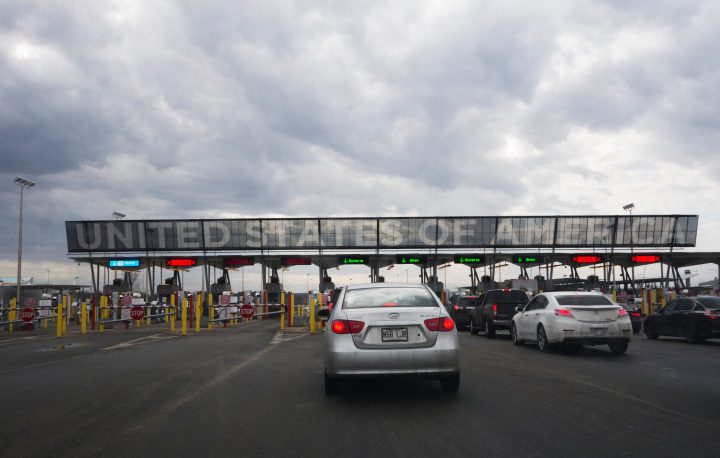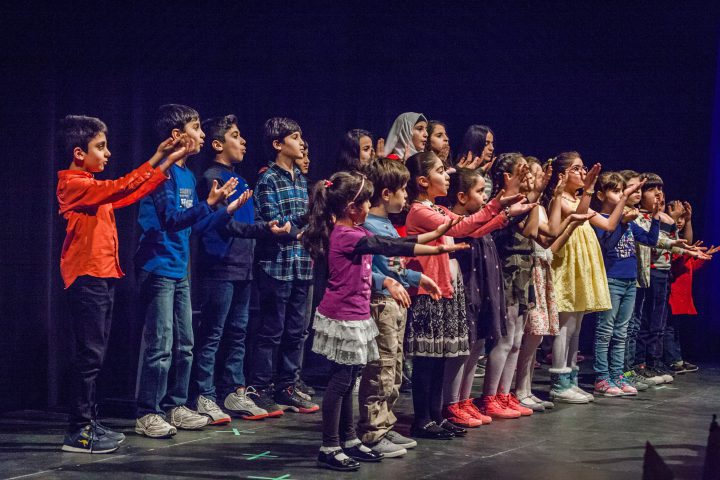Muslims living in Canada often fear discrimination crossing the border into the U.S. — and some say that fear has increased under the administration of President Donald Trump.

This week, the country’s Supreme Court ruled that Trump’s travel ban, which applies to predominantly Muslim-majority countries, wasn’t discriminatory.
The current version of the ban, announced in September 2017, prohibits most people from seven countries — Iran, Libya, Somalia, Syria, Yemen, North Korea and Venezuela — from entering the U.S.
While the ban doesn’t apply directly to those living in Canada, it has stoked fears for some Muslim Canadians that they’ll face discrimination at the border.
READ MORE: U.S. Supreme Court upholds Trump’s travel ban on Muslim-majority countries
Fatima Abrar, who lives and works in Toronto, crosses the border regularly to visit family in Chicago. She told Global News she’s almost never had a problem with border agents.
That doesn’t allay her concern.
“Every time I go I’m just holding my breath, because I’m not sure how this one’s going to go,” she said.
“I’ve heard really strange stories and people having really bad experiences. It really freaks you out.”
With the travel ban in place, Abrar is uncertain of how things will change — if at all.
WATCH: Protests erupt following Supreme Court decision on Trump travel ban

“I’m hoping it doesn’t affect us, but I think in some way, shape or form it will,” she said. “We just have to take the risk of crossing the border, because a lot of the time it’s for personal reasons.”
But it’s not a risk that everyone is willing to take.
Fears of border troubles led a choir of Syrian children from Toronto to decline an invitation to perform at a festival in Washington, D.C. this week.
READ MORE: What Canadian travellers need to know about U.S. travel ban upheld by the Supreme Court
Fei Tang, the general manager of the Nai Kids Choir, said the chorus of about 60 Canadian newcomers between the ages five and 15 will perform at home instead.
“We looked at the political climate… and decided we probably wouldn’t be able to go,” she said.
“It’s just not practical.”
The choir’s trip isn’t the only one that has been cancelled.
The Toronto District School Board stopped planning trips to the U.S. in March 2017 after Trump signed the first iteration of the travel ban, citing concerns that some students would be turned away at the border.
Leila Nasr, who works with the National Council of Canadian Muslims (NCCM), told Global News that the organization has heard from several people who don’t know what the ruling means for them.
“We have received calls and concerns from Canadians who are unsure of how to proceed,” Nasr said. “They already had plans to travel to the U.S., and especially given the long weekend, and they’re worried.”
The organization is concerned the ruling will “exacerbate issues of mistreatment and discrimination” for Canadian Muslims travelling across the U.S. border.
“The main reason for our concern stems from the fact that it reinforces the idea that somehow Muslims are now — if they weren’t before — fair targets for discrimination under the pretext of national security,” she said.
WATCH: Trump says Supreme Court travel ban ruling ‘tremendous victory’ for U.S.

The NCCM is urging Canadian Muslims to be vigilant and prepared when crossing the border. Nasr said that means having all the proper travel documents and having an address for where you plan on staying.
But the organization also has advice for what to do when matters grow complicated.
“If they do experience discrimination, we encourage them to take detailed notes, remember who they spoke to, try and get their badge or identification number, remember if there are witnesses, and what was said to you,” Nasr advised.
The council also has a section on its website that allows Canadian Muslims to confidentially report incidents of discrimination to its human rights department. Nasr explained the NCCM will then contact the individual and provide any added assistance or advice.
READ MORE: Toronto-based Syrian children’s choir turns down festival over fears of crossing U.S. border
Concerns over Tuscan program
The NCCM’s concerns about the border stretch beyond the U.S. travel ban to the Canadian Border Services Agency’s use of Tuscan, a national security database.
The name is shorthand for “Tipoff U.S./Canada;” it describes a U.S. list of names and other basic information about known or suspected terrorists.
It came to light this month that Canada and the United States have started sharing information about suspected terrorists under a revamped agreement, even though the federal privacy watchdog is still studying the possible risks for Canadians.
Several privacy concerns have been raised about the list and there is little public knowledge about what it entails, Nasr said.
“It’s not enough for the federal government to just say, ‘oh, trust us,'” she said. “We need more transparency than this. Our Charter rights dictate that we are entitled to more transparency than that.”
WATCH: Children of detained immigrants call SCOTUS travel ban ruling ‘disgusting’

In an email to Global News, Public Safety Canada said the database is used to help make “decisions on admissibility to Canada.”
“A name match to the TUSCAN database in and of itself does not result in an inadmissibility decision,” the statement said.
Public Safety Canada added that it is just one part of the assessment process.
The government also said procedures are in place to “update and correct information when errors are detected” on the database.
“Protocols also exist around the use and protection of information,” the statement said, but it did not expand on what those protocols entail.
Travelling across the border without difficulty
It’s also important to note that not all Muslims have faced discrimination at the border — and they’re not all nervous.
Jaweria Ashgar, who lives with her husband in Mississauga, Ont., told Global News that the couple often goes to the U.S. to visit family.
Ashgar, who is a permanent resident of Canada and hopes to become a citizen soon, said they rarely experience any difficulty.
“We have been very confident and upfront with the border security, there was nothing to hide,” she said. “Whatever they ask us, we would just tell them.”
The questioning process typically takes a couple of minutes, Ashgar said, adding she believes answering questions honestly will prevent future trouble.
— With files from The Canadian Press






Comments